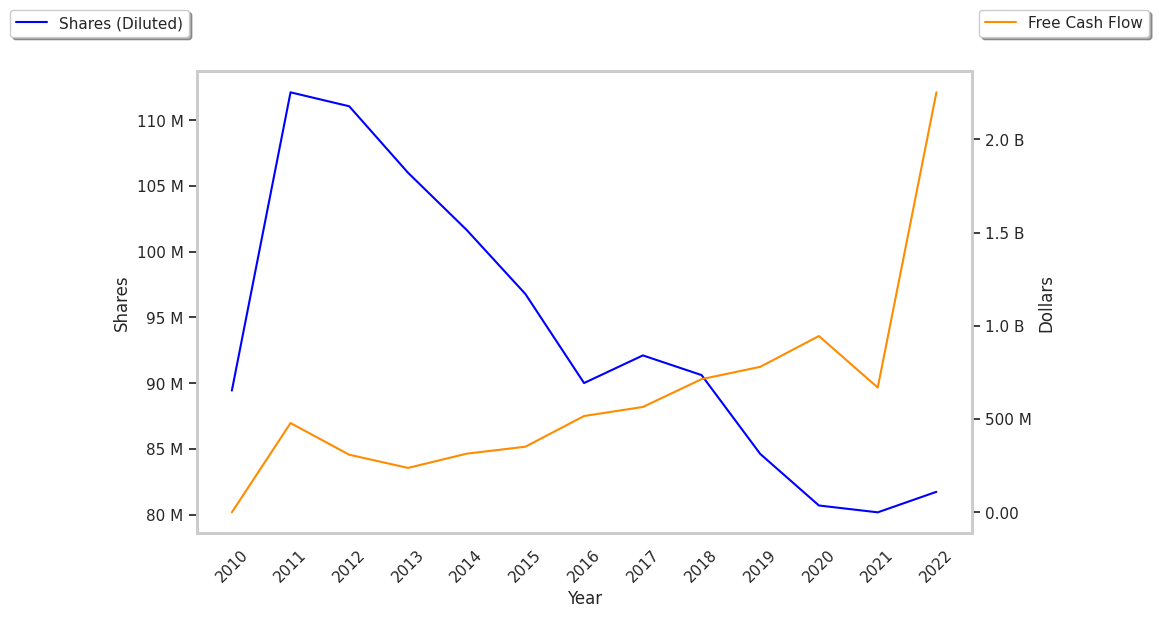Now trading at a price of $329.81, LPL Financial has moved 0.2% so far today.
LPL Financial returned gains of 25.6% last year, with its stock price reaching a high of $403.58 and a low of $252.55. Over the same period, the stock outperformed the S&P 500 index by 11.4%. More recently, the company's 50-day average price was $344.41. LPL Financial Holdings Inc., together with its subsidiaries, provides an integrated platform of brokerage and investment advisory services to independent financial advisors and financial advisors at institutions in the United States. Based in San Diego, CA, the Large-Cap Finance company has 9,389 full time employees. LPL Financial has returned a 0.4% dividend yield over the last 12 months, but this may not be sustainable seen that the company has a choppy cash flow record.
Positive Cash Flows:
| 2019 | 2020 | 2021 | 2022 | 2023 | 2024 | |
|---|---|---|---|---|---|---|
| Revenue (M) | $5,625 | $5,872 | $7,721 | $8,601 | $10,053 | $12,385 |
| Interest Income (M) | $47 | $29 | $104 | $126 | $187 | $274 |
| Operating Margins | 13% | 11% | 8% | 13% | 14% | 11% |
| Net Margins | 10% | 8% | 6% | 10% | 11% | 9% |
| Net Income (M) | $560 | $473 | $460 | $846 | $1,066 | $1,059 |
| Depreciation & Amort. (M) | $96 | $110 | $151 | $200 | $247 | $309 |
| Diluted Shares (M) | 85 | 81 | 82 | 81 | 78 | 75 |
| Earnings Per Share | $6.62 | $5.86 | $5.63 | $10.4 | $13.69 | $14.03 |
| EPS Growth | n/a | -11.48% | -3.92% | 84.72% | 31.63% | 2.48% |
| Avg. Price | $76.64 | $77.58 | $144.05 | $180.79 | $227.62 | $329.25 |
| P/E Ratio | 11.3 | 13.02 | 25.05 | 17.06 | 16.4 | 23.24 |
| Free Cash Flow (M) | $467 | $634 | $237 | $1,639 | $109 | -$285 |
| CAPEX (M) | $156 | $156 | $216 | $307 | $403 | $563 |
| EV / EBITDA | 9.89 | 10.48 | 18.33 | 12.45 | 12.52 | 17.07 |
| Total Debt (M) | $2,399 | $2,345 | $2,814 | $2,717 | $3,734 | $5,495 |
| Net Debt / EBITDA | 2.16 | 2.09 | 3.08 | 1.43 | 1.93 | 2.66 |
LPL Financial has rapidly growing revenues and increasing reinvestment in the business, a strong EPS growth trend, and reasonable leverage levels. However, the firm suffers from weak operating margins with a stable trend and positive cash flows.
LPL Financial's Valuation Is in Line With Its Sector Averages:
LPL Financial has a trailing twelve month P/E ratio of 23.6, compared to an average of 15.92 for the Finance sector. Based on its EPS guidance of $18.58, the company has a forward P/E ratio of 18.5. According to the 15.9% compound average growth rate of LPL Financial's historical and projected earnings per share, the company's PEG ratio is 1.49. Taking the weighted average of the company's EPS CAGR and the broader market's 5-year projected EPS growth rate, we obtain a normalized growth rate of 12.1%. On this basis, the company's PEG ratio is 1.95. This suggests that these shares are overvalued. Furthermore, LPL Financial is likely overvalued compared to the book value of its equity, since its P/B ratio of 5.2 is higher than the sector average of 1.78. The company's shares are currently trading 197.8% below their Graham number.
Analysts Give LPL Financial an Average Rating of Buy:
The 14 analysts following LPL Financial have set target prices ranging from $356.0 to $504.0 per share, for an average of $422.71 with a buy rating. The company is trading -22.0% away from its average target price, indicating that there is an analyst consensus of strong upside potential.
LPL Financial has an average amount of shares sold short because 2.8% of the company's shares are sold short. Institutions own 100.6% of the company's shares, and the insider ownership rate stands at 0.53%, suggesting a small amount of insider investors. The largest shareholder is Vanguard Group Inc, whose 10% stake in the company is worth $2,634,115,274.



